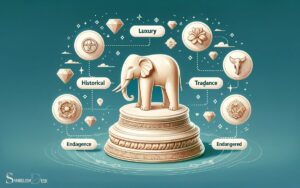What Is the Symbolic Meaning of a Crown? Power!
The crown symbolizes authority, sovereignty, and the highest status within a governing body or monarchy. It is widely recognized as a sign of power, legitimacy, and honor, reflecting the wearer’s elevated position in a hierarchy.
The crown’s symbolic meaning includes:
- Authority: It denotes the ultimate power held by an individual, often a monarch.
- Sovereignty: The crown is a representation of the independent power and governance of a state or nation.
- Honor: Being crowned can signify a person’s exceptional status, achievements, or virtues.
- Religious Symbolism: In many traditions, crowns are associated with deities or used in religious ceremonies to denote divine authority or blessing.
- Cultural Significance: Different cultures imbue crowns with unique meanings and significance, often tied to their own historical and societal norms.
For example, in a coronation ceremony, the act of placing a crown on a monarch’s head symbolizes the transfer of power and the beginning of their reign.
A crown epitomizes leadership and the responsibility that accompanies a high-ranking position.
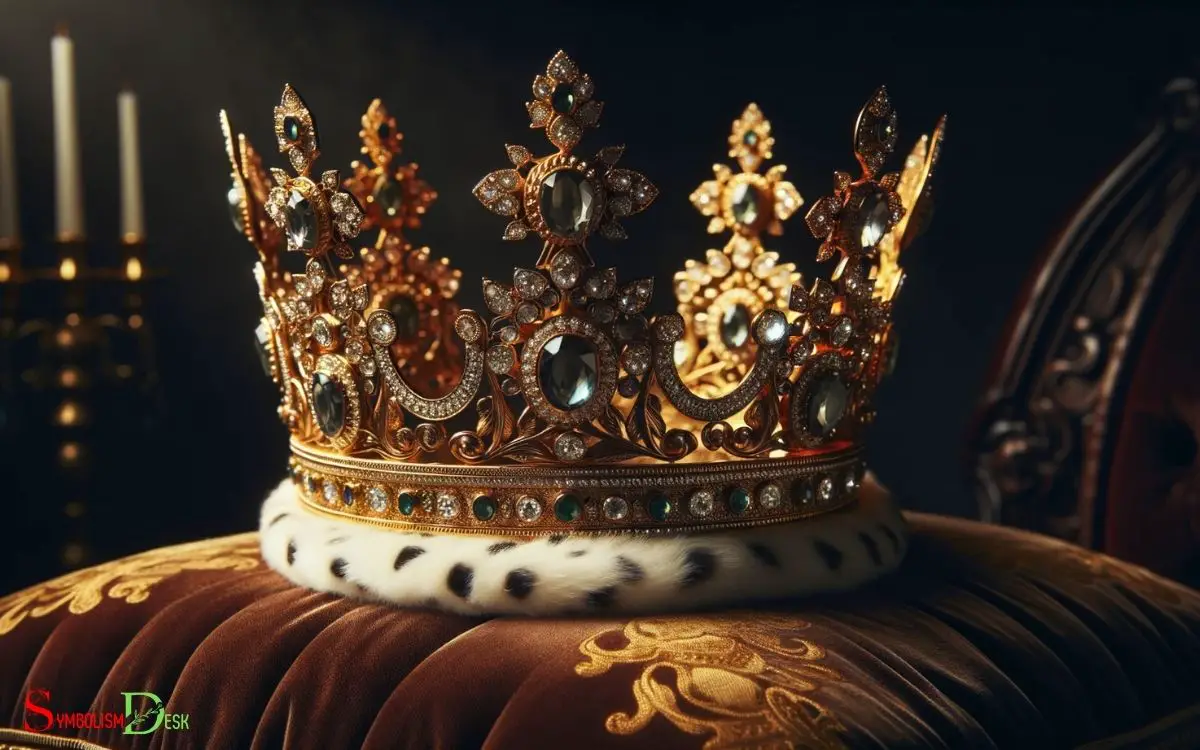
Key Takeaway
Historical Significance of Crowns
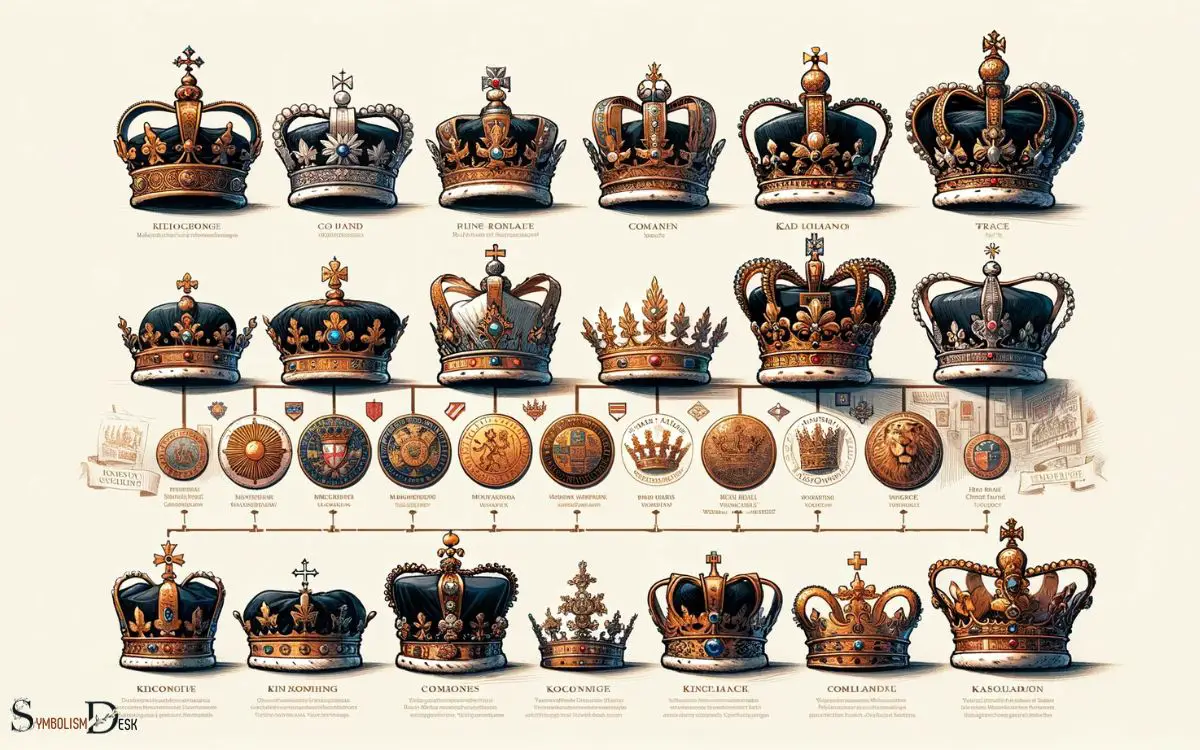
The historical significance of crowns can be traced back to ancient civilizations. In ancient Mesopotamia, Egypt, and Greece, crowns were worn by rulers as a symbol of their authority and connection to the gods.
Over the centuries, crowns became intrinsic to the concept of monarchy and were often adorned with precious metals and gemstones to signify the ruler’s status.
The symbolism of crowns extended beyond earthly power, with many cultures attributing divine significance to the crown and the wearer.
As societies evolved, the meaning of crowns also adapted, but their association with authority and leadership remained constant. Understanding the historical context of crowns provides insight into their enduring symbolism and cultural significance.
Moving forward, it’s essential to explore the cultural representations of crowns.
Cultural Representations of Crowns
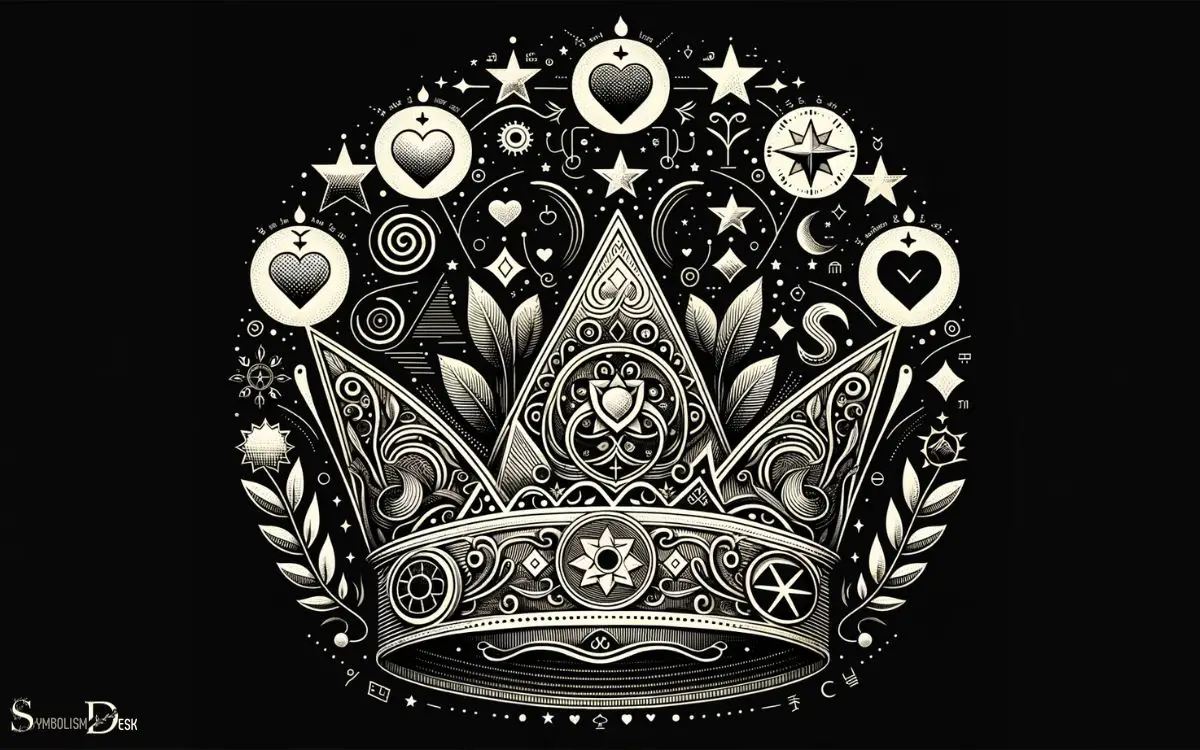
Representing various cultural beliefs and traditions, crowns have held a prominent role in ceremonies and rituals across different societies. The cultural significance of crowns is diverse and fascinating, with each culture imbuing these symbols with unique meanings and uses.
Here are three intriguing cultural representations of crowns:
- European Monarchies: In Europe, crowns are deeply associated with monarchy and royalty, symbolizing power, authority, and divine right to rule.
- African Traditions: In various African cultures, crowns are used to symbolize leadership, spirituality, and the connection between the earthly and spiritual realms.
- Asian Symbolism: In Asian cultures, crowns often represent enlightenment, wisdom, and the spiritual authority of deities and enlightened beings.
The rich cultural representations of crowns provide insight into the diverse ways in which these symbols have been revered and utilized across different societies. Understanding these cultural perspectives adds depth to the symbolic meaning of crowns.
Transitioning to the subsequent section about ‘religious symbolism of crowns’, it becomes evident that the cultural representations of crowns often intersect with religious contexts.
Religious Symbolism of Crowns
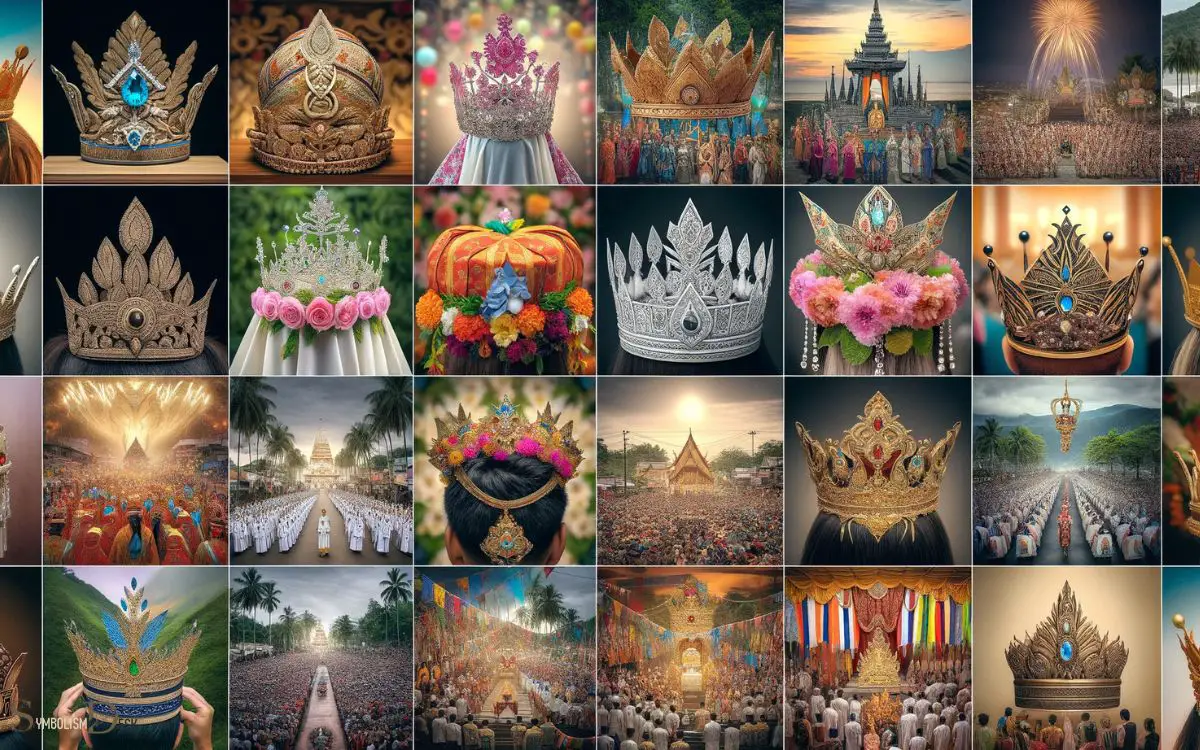
The religious symbolism of crowns carries significant weight, representing divine authority and power.
In many faith traditions, crowns are seen as a symbol of honor and glory, signifying the exalted status of those who wear them.
Understanding the religious connotations of crowns sheds light on their profound significance in various spiritual contexts.
Divine Authority and Power
Crowns have long been a symbol of divine authority and power, holding significant religious symbolism across various cultures and belief systems.
The concept of divine authority and power is deeply ingrained in the religious symbolism of crowns, signifying the following:
- God’s Sovereignty: In many religious traditions, crowns are associated with the divine right to rule, symbolizing the authority that’s believed to be bestowed by a higher power.
- Spiritual Leadership: Crowns are often worn by religious leaders, representing their spiritual authority and their role as intermediaries between the divine and the earthly realm.
- Eternal Kingship: The symbolism of crowns extends to the eternal nature of divine authority, signifying the everlasting reign of a higher power.
This religious symbolism of crowns serves to emphasize the sacred and transcendent nature of divine authority and power, shaping the belief systems and practices of numerous faith traditions.
This understanding seamlessly transitions into the subsequent section about the representation of honor and glory.
Representation of Honor and Glory
Continuing from the previous subtopic, religious symbolism of crowns conveys a sense of honor and glory, embodying the divine authority and power inherent in their wearers.
In religious contexts, crowns symbolize the honor and glory bestowed upon individuals by a higher power. In Christianity, for example, the crown represents the reward for faithful endurance and the ultimate victory over sin and death.
The crown of thorns, worn by Jesus during the crucifixion, is a symbol of the suffering he endured for the salvation of humanity, ultimately leading to his glorification.
In Hinduism, crowns are associated with the divine authority of deities and are often depicted adorned with precious jewels, signifying their exalted status.
Crown as a Symbol of Authority
One significant aspect of a crown is its representation of the ultimate authority and power held by a sovereign ruler. The crown serves as a powerful symbol of leadership and control, conveying the ruler’s supremacy over their domain.
Here are three key points to consider:
- Historical Significance: Throughout history, crowns have been worn by monarchs and emperors, signifying their right to rule and govern their people.
- Legal and Political Authority: In many societies, the crown is a legal symbol of the highest authority, often associated with the head of state or government.
- Symbolic Gestures: The act of crowning a ruler is often accompanied by elaborate ceremonies and rituals, further emphasizing the significance of the crown as a symbol of authority.
Understanding the symbolic meaning of a crown as a representation of authority provides insight into the dynamics of leadership and governance.
Crown as a Representation of Power
The crown has long been recognized as a symbol of power and authority. It serves as a visual representation of leadership, sovereignty, and dominion.
Throughout history, crowns have been worn by monarchs and rulers to signify their position of supreme power.
Symbol of Authority
Crowns are widely recognized as symbols of authority, representing power and sovereignty.
They hold great significance in various cultures and historical periods, embodying the following aspects:
- Political Power: Throughout history, crowns have been worn by monarchs and rulers to signify their authority and dominion over their realms. The crown symbolizes the ability to govern and make decisions on behalf of a nation or territory.
- Divine Right: In many societies, crowns are associated with the divine right of kings, indicating their position as chosen or anointed leaders with a direct connection to the divine.
- Legal Authority: Crowns are often depicted in legal and judicial emblems, representing the ultimate authority and supremacy of the law. They’re a reminder of the power vested in institutions to uphold justice and order.
Understanding the symbolic meaning of a crown as a representation of power provides insight into the historical and cultural significance attached to this iconic symbol.
Sign of Leadership
Leadership is exemplified through the wearing of a crown, symbolizing the authority and influence held by those in positions of power and responsibility.
Throughout history, crowns have been associated with royalty, a visual representation of the leader’s status and their ability to make decisions that impact the lives of their subjects.
The crown serves as a reminder of the leader’s duty to govern wisely and justly, as well as to protect and provide for their people. It’s a powerful symbol that commands respect and signifies the leader’s role as the head of state or community.
The weight and grandeur of the crown further emphasize the gravity of the leader’s position, conveying the immense responsibility that comes with wielding power and the expectations placed upon them.
How does the symbolic meaning of gold relate to the symbolic meaning of a crown in terms of power?
Gold has long been associated with power and wealth, representing the pinnacle of success and prestige. Similarly, the crown has symbolized authority and sovereignty, signifying the right to rule and command. Both the symbolic meaning of gold and the symbolic meaning of a crown carry a sense of dominance and supremacy.
Is the Symbolic Meaning of Wedding Rings Similar to the Symbolic Meaning of Crowns?
The symbolic meaning of wedding rings represents eternal love, commitment, and unity between two individuals. Similarly, the symbolic meaning of crowns also signifies power, authority, and honor. While both symbols hold different significance, they both convey the idea of unity and strength in a relationship or monarchy.
Modern Interpretations of Crowns
In modern culture, crowns symbolize authority and achievement, often associated with royalty and success.
The symbolic meaning of crowns has evolved with time, and in contemporary society, they hold various interpretations:
Fashion and Pop Culture: Crowns are often used as fashionable accessories, appearing in clothing, jewelry, and even tattoos. They’re also commonly featured in popular culture, such as in music videos and movies, symbolizing power and status.
Social Media and Emojis: Crowns have become a popular symbol on social media platforms, where they’re used to convey a sense of superiority or excellence. Additionally, the crown emoji is frequently utilized to denote something or someone as the best or most deserving.
Corporate and Sports Trophies: In modern contexts, crowns are often associated with corporate awards and sports trophies, representing leadership, excellence, and victory. They’re used to honor individuals or teams for their outstanding accomplishments.
Conclusion
The symbolic meaning of a crown is nothing short of majestic and awe-inspiring.
From its historical significance and cultural representations to its religious symbolism and representation of authority and power, the crown commands attention and respect like no other symbol.
It’s the ultimate embodiment of regality and grandeur, making anyone who wears it feel like a true ruler of their domain.






